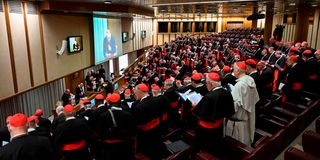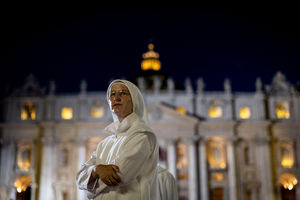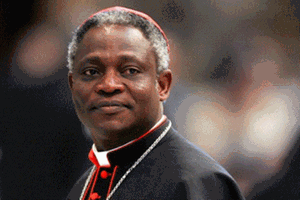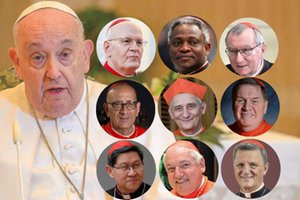
Cardinals participate in a general congregation meeting at the Vatican on April 28, 2025.
It will be white smoke billowing from a makeshift chimney and a bell ringing from the heart of the Vatican.
With that, the world will know that the Roman Catholic Church has a new pope.
The words “habemus papam (we have a pope)” will also flash around.
As to when that will happen, it is a wait-and-see matter. At the first voting session on Wednesday, the first smoke signal of the process was expected in the evening.
But how does it feel like to be in a conclave? Imagine being in a building with hundreds of other people, shut out from the rest of the world and bound by an oath of secrecy. You take a fresh oath even when you return from lunch.
“Shut out” means just that. In fact, the Vatican News reports, the word “conclave” comes from the Latin words cum (with) and clavis (key).
In the conclave, jamming technology is used to disable any telecommunication devices that may be around (they are banned in the first place). There are also mechanisms that block eavesdropping from outsiders and the use of drones.
Reuters reported that on Monday, the governor of Vatican City sent out a note stating that cell phone towers in the tiny country will be deactivated at 3pm on Wednesday local time “until after the new pope’s name is announced”.
The need to maintain secrecy was factored into the pope election process because there was a time when popes were suggested by Christians, and then those suggestions were subjected to voting by bishops. This, the Vatican News reports, was prone to external influence.
“External influences and interference from political powers, of course, played a major role in the election, often hindering the electoral process,” says the Holy See’s press arm.
Besides the conclave, there are many traditions around the election of a new pope.
One of them is that within an hour of the white smoke showing, he should appear on the balcony to greet the crowd.
The other tradition is the smoke. Did you know how they put it beyond doubt that the smoke is black or white? Well, it is by using chemicals when burning the votes cast. History has it that there were times when the on-lookers couldn’t be sure as the smoke would appear grey. This was augmented by the ringing of the bell when a pope has been elected—and the addition of chemicals. The BBC reports that for black smoke, a mix of potassium perchlorate, anthracene and sulphur is burnt. For white smoke, a combination of potassium chlorate, lactose and pine rosin is used.
The traditions also indicate that voting can happen up to four times in a day (though the first day witnesses only one voting session). This implies two sessions before lunch and two others after.
Voting goes on and on until one candidate gets two-thirds of the vote. The chosen pontiff has to accept the election before the announcement is made.
On Wednesday morning, a Mass was held at St Peter’s Basilica for the papal election. The Mass was presided over by Cardinal Giovanni Battista Re, the dean of the College of Cardinals.
“The Cardinals and over 5,000 faithful were in attendance,” the Vatican News reported.
Cardinal Re urged Christians to pray that the Holy Spirit “who in the last hundred years has given us a series of truly holy and great Pontiffs, will give us a new Pope according to God’s heart for the good of the Church and of humanity”.
Two-thirds is the magic number in the papal election. If no one garners two-thirds by the third day of voting, the process will be suspended by a day or less to allow for prayer. The process will also be suspended if seven voting sessions happen without a winner. In each suspension, a cardinal is to address the gathering.
If 21 voting sessions end without a winner, the top two in the last ballot will go into a runoff. The two will not vote, but either must garner two-thirds to be declared pope.
Going by recent trends, the voting is likely to extend by up to three days. Pope Francis, the 266th pope, was elected after two days, in which five rounds of voting happened. His predecessor, Pope Benedict XVI, also emerged a winner after two days of voting. John Paul II was declared Pope in 1978 after three days in the conclave while his predecessor, John Paul I, took the crown after two days. Pope Paul V was elected in 1963 after three days of voting in the conclave while Pope John XXIII was elected in 1958 after four days of voting.









